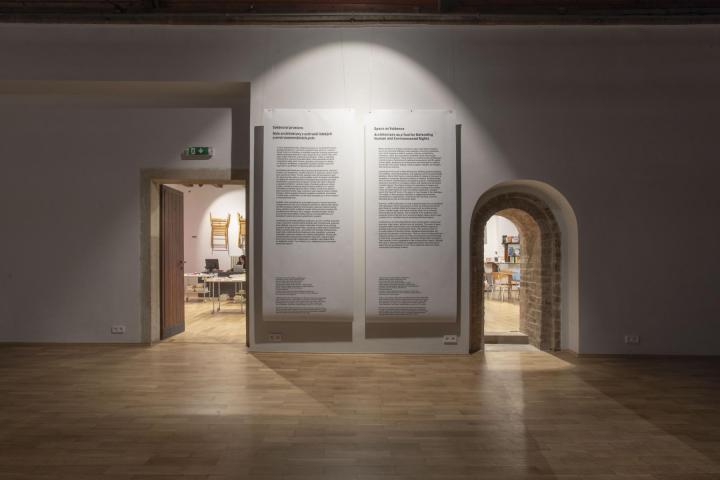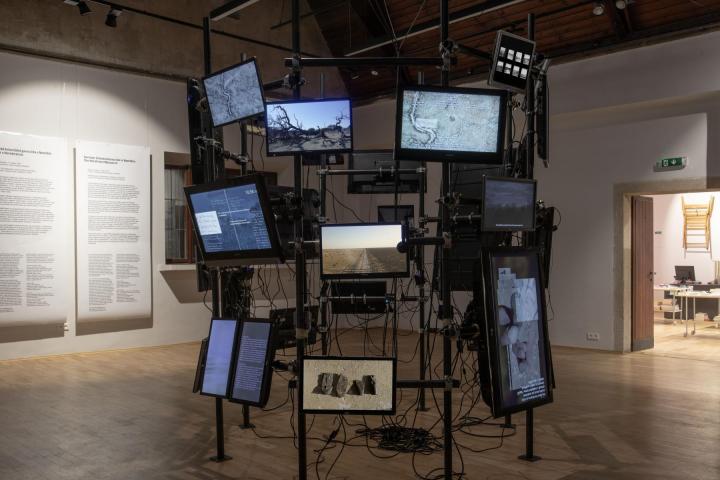
The exhibition will successively present the research teams of Forensic Architecture (UK), Forensis (DE), Alison Killing (NL) and Beirut Urban Lab (LB) and the range of approaches and methodologies they work with. The subtitle of the exhibition, 'The Role of Architecture in the Protection of Human and Environmental Rights', demonstrates that architectural skills need not only be used to design buildings. "Spatial imagination, technical drawing, 3D modelling or mapping are combined by the research teams in an interdisciplinary research with anthropological practices. Their findings contribute to the clarification of cases of public interest that often escape traditional investigative practice, and thus strengthen the voice of the disadvantaged," adds Karolína Plášková from the Jaroslav Fragner Gallery.
The exhibition block opened with a lecture in the gallery space that introduced a project from the multidisciplinary research team at Goldsmiths to University of London, Forensic Architecture in collaboration with their sister Berlin-based agency Forensis. Together they have been working on the massacre of the indigenous people of Namibia by German troops in 1893. The results of the research were first presented at Berlin's Haus der Kulturen der Welt as part of an ongoing investigation into the German colonialgenocide in Namibia. Forensic Architecture are award-winning in the field of human rights, journalism, architecture, design, technology and art. In 2022, the Peabody Awards wrote of them that they co-created "a whole new academic field and a new media practice."
The second major element of the exhibition is a groundbreaking project mapping Chinese detention camps for Uighurs, for which his team won the Pulitzer Prize. Architect Alison Killing worked with journalist Megha Rajagopalan and programmer Christ Buschek to analyse satellite imagery and create digital maps that revealed the extent of the repression. The report project was presented at the Venice Architecture Biennale last year. This year it is also part of an exhibition at the Museum of Architecture of the Technical University of Munich. It will be launched at the Jaroslav Fragner Gallery in Prague with a lecture by Alison Killing herself on Thursday 31 October 2024.
The Beirut Urban Lab (LB), a research collective from Faculty of Engineering and Architecture at the American University of Beirut, will then bring a perspective on conflict and urbanization in the Middle East region on 27 November. Their critical research strives for just and livable cities and contributes to broader academic debates on historical and contemporary urbanization in the Global South.
In addition to those mentioned above, the Office for Political Innovation (US/ES) and the Center for Spatial Technologies (UA) will also participate in the program through lectures. The Czech context will be brought to the six-month block by the research team of the Institute of Forensic Interdisciplinary Research, Socially Emancipatory Design and Architecture (a project of the FaVU BUT and the Faculty of Arts of MUNI), anthropologist and archaeologist of artificial intelligence Sara Polak (CTU FIT) and journalist Zuzana Vlasatá, who deals with the ecological tragedy on the Bečva River.
The testimony of space focuses on the connection between the physical and virtual worlds. "Audiovisual materials, spatial reconstructions and other outputs are intertwined in a dynamic environment that reflects the complexity of the contemporary world," say the exhibition's authors Adam Kvaček and Max Čuhel about the architectural representation of the exhibition.
The exhibitions at the Jaroslav Fragner Gallery look at architecture in an expanded field, this time as a tool to investigate and document injustice. The exhibition series Witnessing Space will run until 2 February, 2025, and will be accompanied by a series of lectures that will introduce visitors to individual investigative projects and methods that help create a more just and sustainable society.
The testimony of space. The role of architecture in the protection of human and environmental rights
9. 10. 2024 – 2. 2. 2025
Galerie Jaroslava Fragnera, Betlémské náměstí 5a, Praha 1
opening hours: wednesday–sunday, 14:00–19:00
voluntary admission
Accompanying programme:
17. 10. 2024 from 19.00 lecture by Jasper Humpert (Forensis): The image in context: forensic techniques and the inversion of perspective
31. 10. 2024 from 19.00 vernisage and lecture Alison Killing: Sintiang internation camps
14. 11. 2024 from 19.00 lecture by Ondřej Mohyla (FaVU VUT – Institute of Forensic Interdisciplinary Research, Socially Emancipatory Design and Architecture): Uncovering the infrastructure of segregation
27. 11. 2024 from 19.00 vernisage and lecture by Beirut Urban Lab
The founder of the Jaroslav Fragner Gallery is the Czech Technical University in Prague. The exhibition and its accompanying programme are realized with the financial support of the Ministry of Culture of the Czech Republic and the City of Prague and with the non-financial support of the Centre for Architecture and Urban Planning (CAMP) and the Institute of Intermedia of the Czech Technical University (IIM).


Author of photography: Šimona Němečková